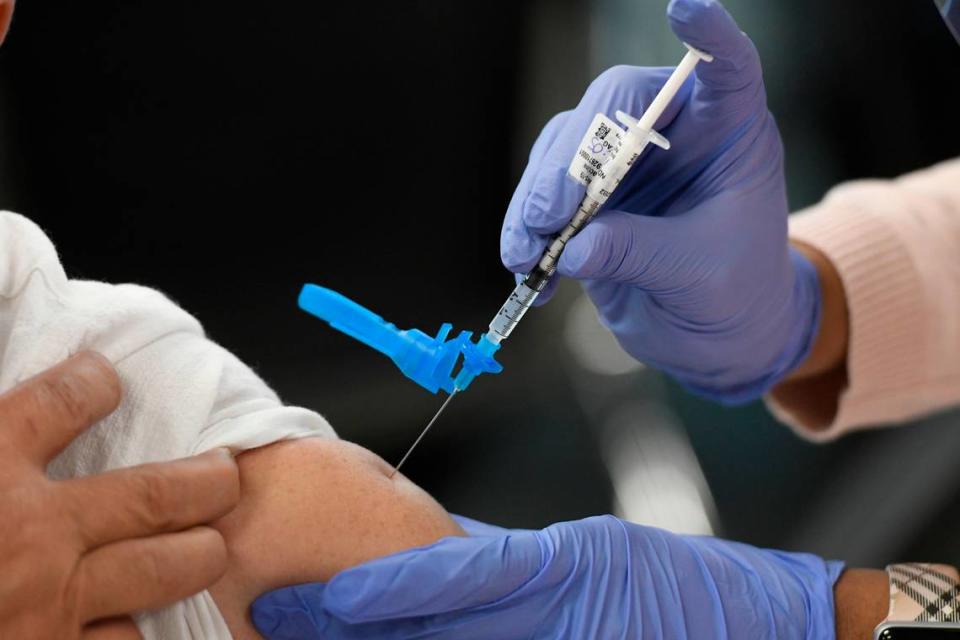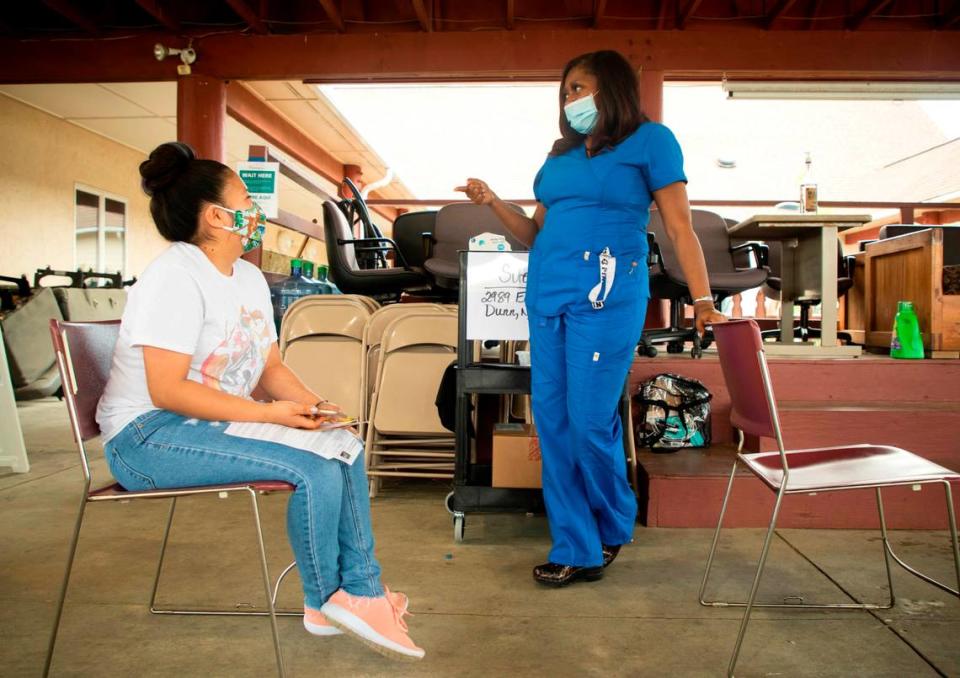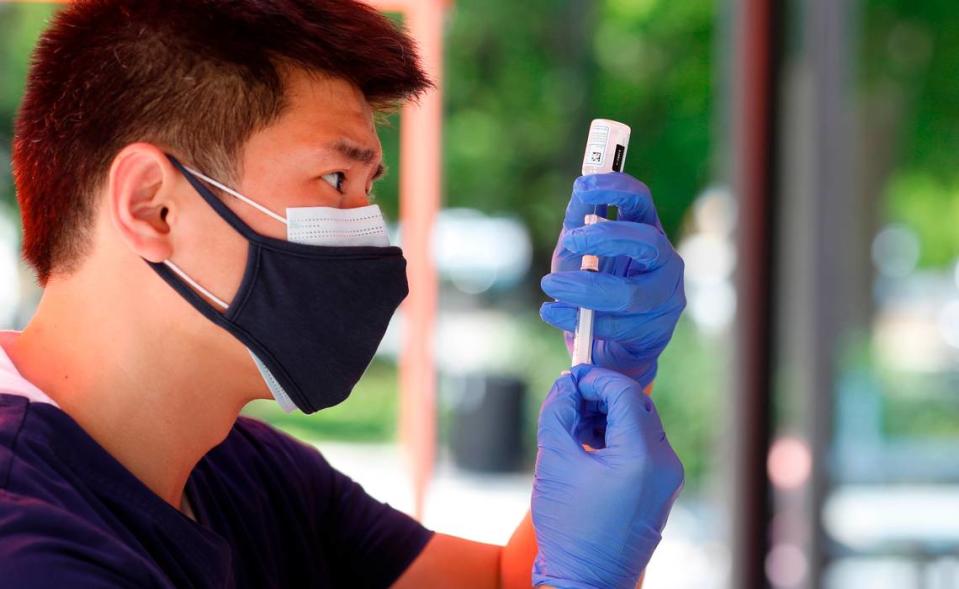The newest COVID vaccine will be available very soon. Here’s when you can get it
- Oops!Something went wrong.Please try again later.
New COVID vaccines will be available later this week, the Centers for Disease Control and Prevention announced Tuesday.
The vaccines will be available just in time for people to get vaccinated by the CDC’s recommended late October deadline.
“Like the annual flu shot, the fall COVID-19 vaccine provides the most up-to-date protection against the COVID-19 virus and will help us prepare for seasonal viruses that disrupt our lives,” said Dr. Elizabeth Cuervo Tilson, state health director and the NC Department of Health and Human Services’ chief medical officer, said in a press release this week.
“Protect your family so you can enjoy the activities, sports, school and time with loved ones this fall and winter.”
September kicks off flu season, and medical experts widely agree that nearly everyone should be vaccinated against the flu by using this early-fall time to get their annual flu shot.
COVID vaccines are becoming an annual immunization too, prompting many to schedule a one-and-done appointment for both shots at the same time.
We talked to UNC Health’s Dr. David Wohl, an infectious disease expert, to learn how we should navigate vaccine season with the new-and-improved COVID vaccine nearly in reach.
Should I wait until the next COVID vaccine comes out to get my shots?
Yes, as these vaccines will be available very soon.
“I think the timing works out pretty well. If we had all gotten it mid to late summer, it may not have been working as well as we’d like to protect us from infection during the surge in the winter,” Wohl said.
“So maybe a silver lining to it being available after school started is that it’s going to protect us better during the winter and winter break period, when we’ve seen the surges before.”
Pharmacies typically get and begin administering vaccines before hospitals and clinics, he said.

How long should I wait between COVID and flu shots?
Most of us should get both shots each fall. For ease, you can get both in the same appointment.
• COVID shots: The CDC says if you have not received a COVID vaccine in the past two months, you should get the updated COVID vaccine — which should be available by the weekend.
It’s safe to get any of the three COVID vaccines, which are Moderna, Pfizer and Novavax. (The Johnson & Johnson vaccine is no longer available.) The brand you’ve received in the past doesn’t make too much of a difference for the vaccine you’ll want to get this year.
“It doesn’t matter which of the three vaccines you get, as long as you get one of them. We’re really talking about Coke and Pepsi here,” UNC’s Wohl said.
• Flu shots: People should get annual flu shot each fall — which is now.
Flu shots are widely available — and often free — at pharmacies and clinics.Select, eligible patients can opt for the needle-less flu vaccine nasal spray available in medical offices.
Whichever you choose, the flu vaccine should be updated yearly at the start of our cool weather season.
Do all COVID vaccines protect against the latest strain of the virus?
Yes, though the new vaccine will be the latest technology to protect against the latest strains.
“The old vaccines certainly help protect us against these new variants, and they all have a commonality that doesn’t make them useless. Some people think that the old vaccines don’t work at all, but they do work, and they protect us in a number of different ways,” Wohl said.
“But I like the new vaccine that’s coming out, and I can’t wait to get it. I think we should all get it. It’s going to be great at protecting us against new variants.”
The newest COVID vaccines are designed to target the XBB strain of the Omicron variant, Duke Health’s Dr. Cameron Wolfe said during a media briefing last week, and be widely available by October.
“Scientists expect that the updated booster, which is a closer match to that variant than any of the other boosters that we’ve had, will remain highly effective against that variant and all of the currently circulating variants,” Duke Health’s Dr. David Montefiori said during a media briefing last week.

Which vaccines should we be getting?
(Almost) everyone should get a flu and COVID vaccine.
• Infants aged 0 to 6 months should not receive either vaccine, according to the Centers for Disease and Prevention’s official guidance. There is currently no FDA-authorized vaccine for either virus for infants this young.
• That means flu and COVID vaccines are strongly recommended for everyone six months and older, with very rare exceptions.
• You should get a COVID shot this fall, even if you’ve already had COVID, the CDC says. The same goes for the flu.
UNC’s Wohl recognizes some people are skeptical about getting vaccines, but he pushes for everyone eligible to get them.
“The virus’ side effects are much, much worse than anything that we’re concerned about from the vaccines,” he said.
Only a small portion of the population should get an RSV vaccine.
• This includes people who are 60 and older who have compromised immune systems and/or heart problems who would be deeply impacted by a flu-like virus.
• Young children and pregnant people can also be candidates for RSV vaccines. Talk to your doctor to see if the RSV vaccine is right for you.
• RSV vaccines typically last two years, and they are not to be taken annually.

Can we get COVID, flu and RSV vaccines at the same time?
Yes. It’s perfectly safe to get all three shots in one appointment.
Most people only need to know if you can get a COVID and flu shot at the same time, and the answer is also yes. (Only select people should be vaccinated against RSV. See above for more information.)
A common strategy is to get one vaccine per arm. If you were to have a localized reaction, you can identify which shot was the cause, UNC Health physician Dr. Anita Skariah previously told The N&O.
“You might be a person that says, you know what, I’m just going to get all the shots I need and take some Tylenol that night, knowing I’m going to feel pretty crummy, but I don’t have to go back and do it all over again,” UNC’s Wohl said.
Adults can now get the RSV vaccine. Here’s who should get the shot and when
Is it OK to get the flu, COVID and RSV shots at the same time? A UNC doctor explains

